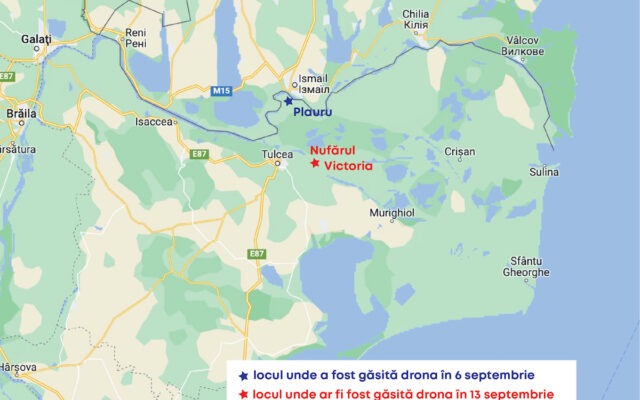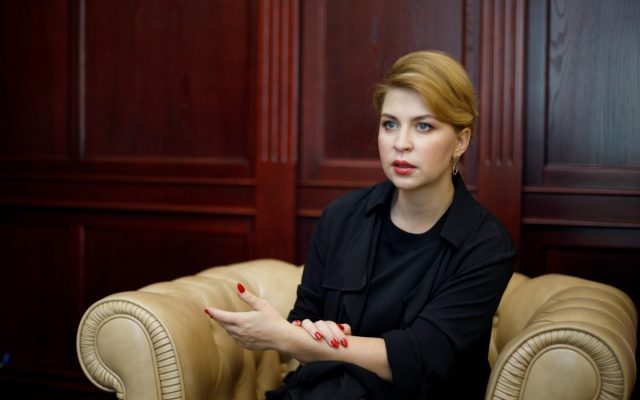
EXCLUSIVE Ukrainian Deputy Prime Minister Olha Stefanishyna: There is some military support provided by Romania / We are grateful that Romania supports Ukraine’s candidacy / Pro-Russian narrative was decisive in the Hungarian elections
Olha Stefanishyna, Deputy Prime Minister for European and Euro-Atlantic Integration in the Kyiv government, told G4Media in an interview that Ukraine is counting on Romania’s support at the European Council where a decision on granting candidate status is expected. The Ukrainian official also said that Romania had provided Ukraine with „some military support”, but added that he could not give details of its nature.
The full interview with Olha Stefanishyna, Deputy Prime Minister for European and Euro-Atlantic Integration:
Rep: First of all, how long do you think the war will last? What is your assessment?
Olha Stefanishyna:
It is an ongoing war, started on all over the territory of Ukraine on 24 of February. It is a full-scale war and unfortunately, it is taking the lives of tens of thousands of Ukrainians. We see that Russia has failed to deliver on any of these statements about the purposes of this military engagement, starting from taking control over Kyiv to get control of major cities, then getting to the borders of Donetsk and Lugansk. So basically now the only possible option left for Russian Federation is to continue the war for exhaustion, the lasting war which will allow them to mobilize their reserves and to exhaust us, to exhaust the rest of the world with a food crisis, and to exhaust the political will of the leaders.
Of course, this is not part of the Ukrainian plan. We stand for regaining back our territories and ending the war.
Rep: Some government officials have said they hope the war will end this year. Do you expect the same?
Olha Stefanishyna: These are the estimates of our military intelligence and forces, based on the data and based on the expected deliveries of the military support from our partners. In just less than 10 days we will have the next coordination meeting in the Rammstein format. And if we reach the moment where we have a continuous, timely, and coordinated delivery of the military support we require, this would be definitely possible to gain the military privilege on the area, but also to get the breakthrough moment in conjunction with the restriction measures applied also after the 6th package.
So we trust our forces, our intell, very coordinated with the democratic countries, there is an estimation, but we should not underestimate the Russian hybrid warfare instruments, the political propaganda and cyber instruments. They still have the internal reserves they will be able to continue functioning.
Rep: Since you opened the discussion about military aid received by Ukraine, is there such military aid provided by Romania?
Olha Stefanishyna: Yes, there is a certain amount of military support provided by Romania, and the Romanian Minister is taking part in the Rammstein format and the coordination format. So for us, it is really important the continuity and the timing of the deliveries. So we hope that with the decision of the US to provide a lend-lease format for deliveries of the weapons for Ukraine, this will also facilitate deliveries from other countries like Romania, for example.
Rep: Can you elaborate on this? What kind of weapons or equipment has Romania delivered?
Olha Stefanishyna: I am not sure this is releasable information in full amount, I have to check and then provide this information later. Because there is an individual approach with every country. But basically, we prioritized the weapons we need, including 155 mm artillery equipment, but also tanks and armored vehicles, and long-distance artillery.
Rep: Is that what you need in general, not just from Romania?
Olha Stefanishyna: Yes.
Rep: How do you assess Romania’s help with refugees and the corridors for goods?
Olha Stefanishyna: For us since the first days of the war, the neighboring countries, but especially Romania, Poland, and Slovakia have been very open to hosting our people. This was very important. They were hosted in these countries, with many challenges, but the authorities were very effective, working 24/7 to set up logistic hubs to distribute the assistance properly. Supporting the green corridors for refugees, but also for our goods is very important. EU countries are the only place from where we can release our goods.
This is part of the understanding we are already part of the European family and this is how solidarity looks to us.
Rep: Ukraine has formally applied for EU candidate status. A decision is expected at the European Council in June. What are your expectations for granting this status?
Olha Stefanishyna: This very serious public debate among the European leaders shows the seriousness of the issue which will be discussed by the end of June, namely the potential decision to grant Ukraine the candidate status by the end of June. Romania is really serious about this decision and the Romanian government understands the historical timing in which this decision should be taken; understands of strategic importance of this step. So we are grateful for supporting us and probably other applications, from Georgia, and of course, there is support for Moldova.
We hope that having this very significant and recent background of integrating in the EU, the Romanian government would advocate for this decision and would bring a lot of explanations to those skeptical countries who are still hesitating.
For us this decision is important to command the previous achievements reached in the last 7 years, a significant backdrop of reforms implemented. We treat this decision as a political one, because most of the skeptical countries do not understand how much we are already integrated in the EU. But countries like Romania know better than others because we share common borders, a lot of trade and market, and logistics.
It is very important that these days Romania could become an advocate of knowledge about Ukraine. The public support is more than 65% in favor of supporting Ukraine’s aspirations.
Rep: Are you confident that the Romanian government will support Ukraine at the next European Council?
Olha Stefanishyna: Our president has been in permanent contact with the Romanian president and this declaration was already stated publicly, and we are sure that together with other East European countries there will be leadership shown by the end of June and thus we will avoid the mistake of not making this decision.
Rep: What are your expectations from Hungary regarding the expected decision at the European Council? The Hungarian government has not been on the same page with Romania or Poland since the beginning of the war. Moreover, just last week Budapest supported Russian Patriarch Kiril against EU sanctions.
Olha Stefanishyna: We expect more active reflections from the European institutions and other European capitals. The recent statement about the Ukrainian president was extremely harmful, for the general bilateral relations, they should become the eyes opening for EU leaders and EU institutions in terms of the measures taken with regard to Hungary subject to their compliance with the criteria for membership in the EU. And I think this is a very dangerous signal and recent developments really show there is a huge commitment to Russian influence. And this has been Russian support, and the pro-Russian narrative has been really decisive in terms of the recent elections in Hungary. So this is a very dangerous signal and as we now see in the war in Ukraine, the hunger and the appetite of the Russian Federations, we should not allow the growth of a dictatorship in our own area.
The measures should be taken at the level of the European Commission and the leaders should condemn such actions.
Rep: We have heard statements by the French President and the Austrian Chancellor about a two-stage European integration of Ukraine. What is your position on this option?
Olha Stefanishyna: A bit more than a week ago I was in Paris and talked with ministers and presidential advisers. We made a public statement that these proposals do not undermine the formal process of membership. This is what is important for us: that we are going through a formal process and we are not captured in the game of promises. And after gaining candidate status to the EU we are ready to discuss different formats because we understand the complexity of the issues related to the EU enlargement. We are ready to be part of the discussions being in parallel in the process of joining the EU.
So I can confirm that it is not yet a full-shaped proposal and is rather a proposal to the perspective. But we have been clear in our message that we don’t consider any kind of plan B. We have been a very experienced nation in promises where somebody has not delivered – and in Bucharest in 2008 was such a promise. So we have been clear and French ministers were clear that they are not intending to undermine the expectations that we have with this initiative.
Rep: Is it possible that at the European Council we will see different decisions for Ukraine, Moldova, and Georgia, the three countries that have formally applied to open EU accession negotiations?
Olha Stefanishyna:
Again, there is a lot of complexity in the issues related to enlargement. We think we should undergo an individual approach because these are 3 different countries, with different situations and different amounts of transformations and readiness to join the EU. So it is a task for the European Commission to identify what speed and what track should be applied to each country. Although Ukraine was from the very first day one of the inspirations of the Association Trio format. While of course, we have Association Agreements with differences. We will see how the process will be going.
Rep: About the cooperation with Romania for the export of Ukrainian products. We have seen that there are some bottlenecks for Ukrainian carriers in the port of Constanta, but also in road customs. Have you discussed this issue with the Romanian government?
Olha Stefanishyna: Yes, we have permanent talks. But we have a lot of problems on our area, especialy on transportation on sea or on the Danube. But Romania has been a very inovative partner for us because the Danube is overloaded with cargo and we have 24/7 coordination. Romania has been very experienced in transportation on the Danube and we have very good coordination. We are learning by doing. And the practice of more than 3 months shows that whenever there is a problem, there are solutions and a full commitment to identify it.
Rep: The post-war reconstruction of Ukraine is a theme that President Zelensky also spoke about. What role do you see in this process for a country like Romania?
Olha Stefanishyna: Romania has already supported the initiative of the European Commission and has already committed to rebuilding Ukraine. Also, reaching different capitals to take the political patronage over the reconstruction of specific regions of Ukraine affected by the war, we hope this leadership will also be shown by Romania.
Olha Stefanishyna’s bio. She has been Deputy Prime Minister for European and Euro-Atlantic Integration in the Ukrainian government since June 2020 and has 13 years of experience in European and international law. She worked in the Ministry of Justice and was Director-General of the Government Office for European and Euro-Atlantic Integration. She holds a master’s degree in international law and a degree in economics. She studied at the Diplomatic Academy in Vienna and the Estonian School of Diplomacy.
Urmărește mai jos producțiile video ale G4Media:

Donează lunar pentru susținerea proiectului G4Media
Donează suma dorită pentru susținerea proiectului G4Media
CONT LEI: RO89RZBR0000060019874867
Deschis la Raiffeisen Bank
